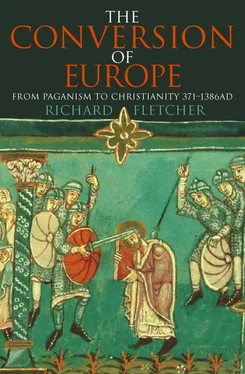Bede’s telling of the story sets it in the market-place of Rome and alleges that the English boys were up for sale as slaves. There is nothing intrinsically implausible about this. We need to remember that the slave trade was probably the most widespread business activity of the early medieval world. It is not inconceivable that some of the Frankish luxury objects excavated from the cemeteries of Ethelbert’s Kent were paid for with English slaves. In this connection it is of great interest to find that Pope Gregory wrote in September 595 to his agent Candidus, who was on his way to administer the papal estates in southern Gaul, ordering him ‘to buy English boys of seventeen or eighteen years of age in order that they may, dedicated to God, make progress in monasteries’. 8 The context makes it clear that the pope had in mind his own or other monasteries in Italy, because he requests that the boys be sent to him: ‘and because they are pagans who are to be found there, I wish a priest to be sent with them so that, should illness strike in the course of the journey, he may baptise those whom he sees to be at the point of death.’ It is not easy to interpret this letter. Some have assumed that the pope’s intention was to train the boys as missionaries who could then be sent back to evangelize the Anglo-Saxons: but there is not a hint of this in the text. A commonsensical reading might suggest that the pope simply wanted Candidus to get a supply of domestic slaves for use in his monasteries, though this is not an interpretation that commends itself to the pope’s admirers. It is unwise to use this letter in support of the view that Gregory was planning a mission to the Anglo-Saxons as early as 595 – though he may have been. In a letter to Bishop Syagrius of Autun written in July 599 Gregory said that he had been thinking about the mission to England ‘for a long time’ ( diu ). 9 At the least we may safely say that the letter shows that in the late summer of 595 the pope’s mind was busy with thoughts of the English and their paganism.
He will also have been aware that the Anglo-Saxons inhabited an island that had once been part of the empire. Gregory was a Roman through and through. He came from a family with a proud tradition of public service, he had respect for Roman order and administration, and – despite his strong Augustinian leanings – he had been trained to familiarity with ideas about the providential role of the empire in the divine scheme. His was a world in which it was inconceivable not to take the empire for granted. It is worth recalling that still in Gregory’s day and for much of the century to come Constantinople continued to cast long shadows of influence across the western provinces. We should remember too that after the Justinianic reconquests of Gregory’s childhood the empire still governed Sicily, north Africa as far as the Straits of Gibraltar and a sizeable chunk of south-eastern Spain. Furthermore, Gregory looked out upon a world in which, by the 590s, all the barbarian successor-states had adopted Christianity excepting only the Anglo-Saxon kingdoms of England.
Combine this with Gregory’s sense of pastoral urgency and we have a context, what could be termed a temperamental context, for the initiative he took with regard to England. That initiative was the despatch in 596 of a party of missionaries to the court of King Ethelbert of Kent. Bede, our prime narrative source, tells us that Gregory did this ‘on the prompting of divine inspiration’. It may have been so; but we must beware of ascribing the initiative solely to the pope or to God, even though this has been the received interpretation of the origins of the mission from Bede’s day onwards. But even Bede’s account is not without its difficulties. He tells us – and the information certainly came to him from Canterbury – that Ethelbert died twentyone years after he had received the faith. Now since Ethelbert died on 24 February 616 it is evident that this ‘reception’ (whatever it may have consisted of) occurred in the year 595; or, to be pedantically accurate, between 24 February 595 and 23 February 596. If this piece of information is accurate it may fittingly be considered alongside a remark made by the pope himself. Writing to the royal Frankish brothers Theudebert and Theuderic in July 596 – it is the letter in which he referred to Frankish influence in Kent – Gregory put it on record that ‘we have heard that the people of the English wishes to be converted to the Christian faith .’ 10 One could not ask for a more explicit, authoritative and of course strictly contemporary statement that some approach had been made from the English side. It looks as though Gregory was responding to an appeal rather than launching a mission into the unknown. We might care to cast our minds back – as perhaps Gregory did also – to earlier such responses: the sending of Ulfila to the Christian communities of Gothic Dacia, for example, or of Palladius to the Christians of Ireland.
If an approach was made to the pope in 595 or early 596 one must ask how it was transmitted, and our thoughts turn at once to Queen Bertha and Bishop Liudhard. Bertha would have known of her greatgrandmother’s part in the conversion of her husband Clovis. She may well have received a hortatory letter reminding her of it, like the one which Chlodoswintha got from Nicetius of Trier, when she went off as a bride to Kent. Her assistance in the conversion of Ethelbert was acknowledged by Pope Gregory in a letter he sent to her in 601. When something happened in 595 which made it clear to Bertha that the king was ripe for conversion – perhaps it was a victory in battle, as in the case of Clovis – she turned – to whom? Not to the pope directly, for surely we should have heard of this in Gregory’s correspondence. Most likely it was to her royal relatives in Francia. After all, it was in a letter to Theudebert and Theuderic that Gregory said that he had heard of the English desire to be converted.
Theudebert and Theuderic were children. The regent for them was their grandmother Brunhilde, the most powerful presence in Frankish Gaul in the 590s. Her ghastly end – torn apart by wild horses on the orders of her nephew-by-marriage King Chlothar II after a prolonged struggle for power – and the subsequent blackening of her reputation must not blind us to both her political skill and her piety. When Columbanus arrived in Gaul in about 590 it was Brunhilde and her son Childebert who gave him land and royal protection for his early monastic foundations in Burgundy. (Brunhilde later quarrelled with Columbanus, but that is another story.) Columbanus came from an Irish church where the memory of Patrick was kept green; he had his own vivid sense of mission. He touched the minds of his royal patrons. They in their turn were in contact with Pope Gregory. Childebert and the pope exchanged letters in the summer of 595. Gregory wrote to Brunhilde and Childebert again in September, commending to them his agent Candidus (to whom he was writing at the same time about purchasing English youths). They were again in touch in 596 when Brunhilde’s priest Leuparicus passed between them, bringing relics of St Peter and St Paul as a present from the pope for the queen on his return journey. In 597 she asked for a book which Gregory sent her. Brunhilde founded a monastery at Autun to which the pope granted privileges at her request in 602. The bishop of Autun, Syagrius, was close to the queen: Gregory rewarded his services to the English mission with a special mark of papal favour in 599. The scene was thus more complicated than Bede’s narrative suggests: there was an English king who wanted to become a Christian and a pope with an overwhelming desire to save souls. Linking them was the Frankish royal court, provider of information and later, through the bishops, of practical help.
Читать дальше












